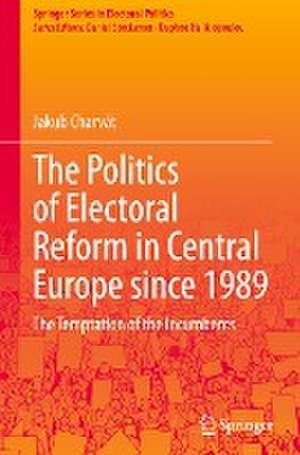The Politics of Electoral Reform in Central Europe since 1989: The Temptation of the Incumbents: Springer Series in Electoral Politics
Autor Jakub Charváten Limba Engleză Hardback – 7 noi 2023
Based on a detailed analysis of electoral reform processes in Czechoslovakia, Czechia, Hungary, and Slovakia over the past thirty years, the book discusses how the politics of electoral reform in Central Europe is mostly driven, controlled, and decided by politicians, with other actors being either overlooked or ignored. Finally, it argues that most of the cases were imposed by an elite majority, with the sole exception of the Czech Republic, where the politics of electoral reform were influenced by the intervention of the constitutional court as an external actor.
The book will appeal to students, researchers, and scholars of political science interested in a better understanding of electoral politics in general, as well as democratic transformation processes and electoral reform in Central Europe.
Preț: 697.15 lei
Preț vechi: 820.18 lei
-15% Nou
Puncte Express: 1046
Preț estimativ în valută:
133.42€ • 138.77$ • 110.14£
133.42€ • 138.77$ • 110.14£
Carte tipărită la comandă
Livrare economică 14-28 aprilie
Preluare comenzi: 021 569.72.76
Specificații
ISBN-13: 9783031450822
ISBN-10: 3031450825
Pagini: 166
Ilustrații: VII, 166 p.
Dimensiuni: 155 x 235 mm
Greutate: 0.43 kg
Ediția:1st ed. 2023
Editura: Springer International Publishing
Colecția Springer
Seria Springer Series in Electoral Politics
Locul publicării:Cham, Switzerland
ISBN-10: 3031450825
Pagini: 166
Ilustrații: VII, 166 p.
Dimensiuni: 155 x 235 mm
Greutate: 0.43 kg
Ediția:1st ed. 2023
Editura: Springer International Publishing
Colecția Springer
Seria Springer Series in Electoral Politics
Locul publicării:Cham, Switzerland
Cuprins
Chapter 1. Introduction.- Part I. The Politics of Electoral Reform: A Framework for Analysis.- Chapter 2. Electoral System Change: A Theoretical Perspective.- Chapter 3. Political Consequences of Electoral Reforms: Proportionality and Personalisation.- Part II. Electoral Systems under Re/Construction: What Electoral Systems for new Democracies?.- Chapter 4. The Most Complex Electoral System as a Compromise: The Hungarian Negotiations of 1989.- Chapter 5. The Politics of Electoral Reform as a Dispute over the Role of Parties: Czechoslovak Debates in the Early 1990s.- Part III. Cuius regio, eius regulae electionis: Attempts at Changing the Rules of Democracy.- Chapter 6. Aiming to Secure a Parliamentary Majority: The 1998 and 1999 Electoral System Changes in Slovakia.- Chapter 7. Clashing over the Rules of Democracy: The 1998–2002 Czech Electoral Reform.- Chapter 8. Manufacturing the Monopoly of Power: The Electoral System Change under Orbán.- Chapter 9. Constitutional Court Backon the Scene: The 2021 Czech Electoral Reform.- Part IV. The Politics of Electoral Reform: A Central European Perspective.- Chapter 10. Electoral Reforms in Central Europe since 1989.
Notă biografică
Jakub Charvát is an Assistant Professor at the Department of Political Science and Anglophone Studies, Metropolitan University Prague, Czechia, and at the Department of Political Science, Faculty of Arts, Jan Evangelista Purkyně in Ústí and Labem, Czechia. He serves as the Editor-in-Chief of Politics in Central Europe. His research focuses on elections, electoral systems, politics, and the contemporary history of the Czech Republic and Central European countries.
Textul de pe ultima copertă
This book on the politics of electoral reform in Central Europe since 1989 explains by whom, why, and how the electoral rules were changed in Central Europe in the post-Communist period. Examining the contextual factors affecting, underlying, and/or initiating these changes, the book identifies main actors, their motivations, and other circumstances surrounding the electoral reform processes. It further explores their political consequences, particularly on proportionality and personalization.
Based on a detailed analysis of electoral reform processes in Czechoslovakia, Czechia, Hungary, and Slovakia over the past thirty years, the book discusses how the politics of electoral reform in Central Europe is mostly driven, controlled, and decided by politicians, with other actors being either overlooked or ignored. Finally, it argues that most of the cases were imposed by an elite majority, with the sole exception of the Czech Republic, where the politics of electoral reform were influenced by the intervention of the constitutional court as an external actor.
The book will appeal to students, researchers, and scholars of political science interested in a better understanding of electoral politics in general, as well as democratic transformation processes and electoral reform in Central Europe.
Caracteristici
Discusses post-Communist political developments in Central Europe Presents a theoretically-informed qualitative analysis and detailed empirical case studies Includes tables that allow the reader a better understanding of the topic






